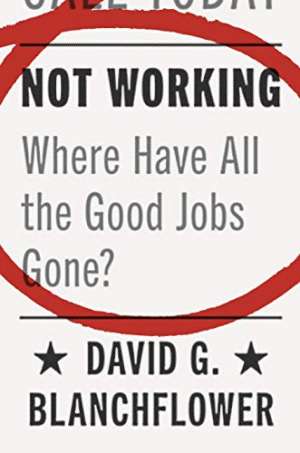24 April 2020
Not Working:
Where Have All The Good Jobs Gone?
David G Blanchflower
2019, Princeton, 440 pages,
ISBN 9780691181240
Reviewer: Kevin Gardiner

Current circumstances favour Professor Blanchflower’s book, published at the top of an upswing he almost denies happened.
The focus is mostly, but not exclusively, on the UK and US. He argues that the last decade’s fall in unemployment overstated labour market temperature because it overlooks underemployment – discouraged workers not in the workforce, or participating less fully (working shorter hours) than they’d like.
This, he says, largely explains why wages did not respond to the upturn, which was in any case “the slowest peacetime recovery in three hundred years since the South Sea Bubble” (p314).
Blanchflower makes this uncontentious point at some length. But then he goes on to discuss, among other things: economic inequality; the housing market; the US opioid crisis; the failures of macroeconomics; the ascent of Trump, Brexit and populism generally; and the harshness of fiscal austerity, which he sees as motivated by greed and malice.
He writes informally and anecdotally, but highly normatively. He does not seem to have enjoyed his time on the MPC in 2007-9, though he is keen to tell us about it. (Apparently, he was the only member of the Committee in touch with the real world, and its best forecaster.)
I share his views on the poor state of macroeconomics, and on economists’ misplaced faith in mathematics. Like him I think we’d be better off trying to emulate plumbing, rather than physics. He is also right to criticise the data-mining (and occasional poor spreadsheet skills) that gave us the supposed rules about public debt and growth.
Overall, however, I think the book contains too much sentiment, and not enough perspective.
Professor Blanchflower dedicates it to two mentors who taught him to do “economics with a conscience”. That conscience is certainly visible: he is a good bloke. He thinks unemployment, frustrating jobs, inequality, drug addiction, unhappiness, and nationalism (among other things) are bad. But who doesn’t? The point is how to tackle them.
Blanchflower’s proposed solutions account for a tiny fraction of the book. He suggests a full-blooded Keynesian “pedal to the metal” (routinely, not just in times of emergency). He also favours more infrastructure spending, childcare support, housing market flexibility, altered attitudes and of course higher taxes on the well-off. (He also suggests improving incentives, perhaps with a universal basic income, which sits a bit uneasily with his argument that labour is in excess supply.)
Another concern is that Blanchflower largely ignores the wider supply side, and business generally (apart from criticism of venal CEOs). He is not interested in the tiresome need to produce stuff people want to buy, using money in which they can have some confidence. To be fair, he is a labour economist – but that doesn’t stop him opining on other matters where it suits.
The lack of perspective is perhaps a little ironic, because Blanchflower favours “the economics of walking about”. He says his unique insights are derived from common sense and pertinent anecdotes.
He takes surveys of public mood far too seriously: if you ask people if they are happy, you shouldn’t be surprised at the answer, or think that it tells you anything useful (John Stuart Mill surely had the right idea there). And to compare recent misery with the Plague (“The Great Recession is the twenty-first century’s bubonic plague” – page 212, no sign of irony), or with the Great Depression, or even with the time of Yosser Hughes, is just crass.
In conclusion, you will cheer this book if you share Blanchflower’s partisan stance, and think the global economy was in particularly bad shape before the response to Covid-19.
If, instead, you thought that the average person had rarely been better fed, clothed and housed, or safer and (yes) healthier; that there is a limit to what economic policy can be expected to achieve; and that hate and incompetence are not located uniquely in one political party, then you may be disappointed.
Blanchflower says “The big issue is how to bring back the good, well-paying jobs.” (p297). There never was a time when everybody had a “good job”. The poor gain least in booms, suffer most in slumps, and their would-be champions let them down with bad counsel. Shelve this book with Varoufakis.
